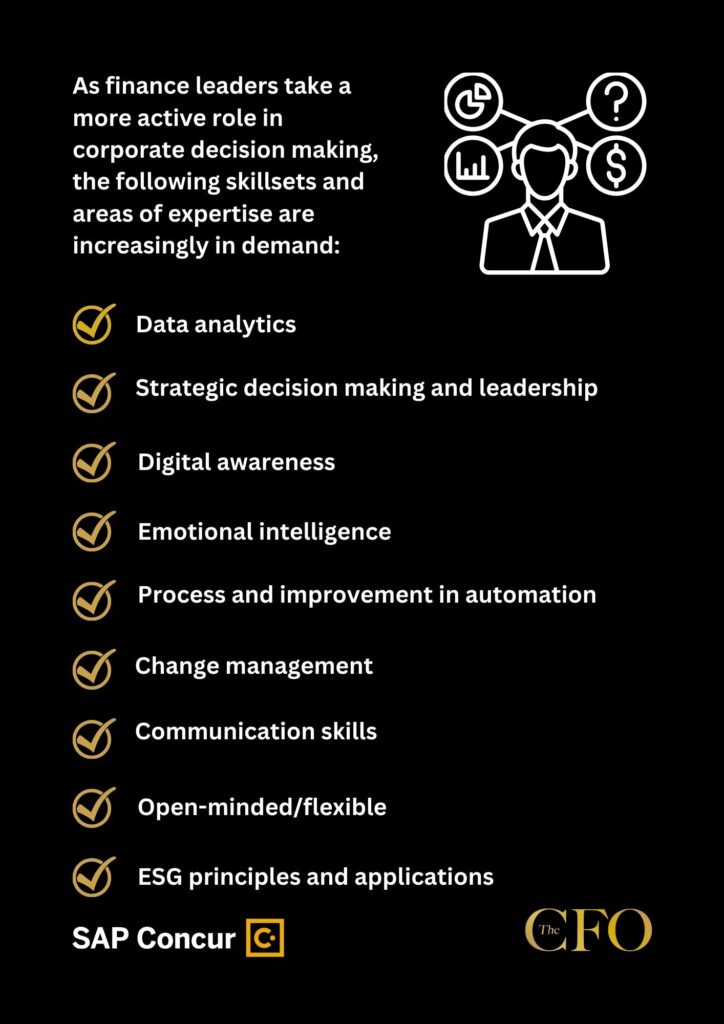How technology is changing the skills finance leaders need to thrive
Finance leaders have arguably never faced a more challenging yet exciting landscape
Finance leaders have arguably never faced a more challenging yet exciting landscape

In a post-pandemic environment bearing a legacy of turbocharged digital adoption, UK finance leaders have never been under greater pressure to contribute data-driven insights and shape strategic decision-making.
Key challenges include navigating a persistently difficult hiring landscape: unemployment touched a seasonally adjusted rate of just 3.7% in the November to January period, according to Office for National Statistics data.
The financial labour market is particularly tight, with 4.5 unfilled vacancies for every 100 job openings between December and February, down from last summer’s peak, but still among the highest ratios in the service sector.
With the economy forecast to skim recession and interest rates on the rise, the onus is on finance leaders to do more with less, making the ability to identify and leverage digital solutions that automate menial tasks and synthesize back-end processes more valuable than ever.
Cloud-based mobile apps that allow staff to file expenses on the move and software that automates expense claims are improving employee wellbeing by freeing up time and resource for colleagues to take on higher value, more challenging tasks.
In an era of hybrid working that can engender an “always on” culture, this is a boon for bosses as engaged employees are less likely to lose morale or burnout.
Yet for team leaders operating in offices that have largely completed the transition to cloud services, according to a UK Finance-led report, the most pressing challenge is to leverage data analytics and digital insights to guide strategic decision-making.
“Finance has transformed from back-office bean counters to being involved in driving company decisions from the get-go,” says Ryan Demaray, global head of Sales at SAP Concur, which provides organisations with expense, invoice and travel solutions.
Technologies like intelligent character recognition, machine learning (AI), data extraction, and document recognition streamline regulatory compliance, allowing leaders to leverage the additional time and insights to make a more impactful contribution to corporate strategy.
External audits are another area where technology can alleviate the strain on finance departments, having an automated expense system can save time when it’s time for an audit, as everything is easily accessible, according to Demaray.
“Take ESG (environmental, social and governance), if all you have been doing is looking at whether you’re spending money in a way that complies with sustainability criteria, you can then look at whether your vendors themselves have sustainability targets,” he explains.
Of course, understanding of ESG principles is another in-demand skillset, underscored by AICPA/CIMA and Oxford University launching a new sustainability programme for accountants to plug an industry gap in the segment.
Having identified an opportunity to improve a financial outcome – perhaps a product line, market or SKU that commands higher margins and therefore demands greater focus – it is incumbent on finance leaders to effectively communicate those insights across their business.
“They need to become cross-functional – and that requires the emotional intelligence – spanning self-awareness empathy, and prioritising employees and team spirit – to communicate and align organisational needs,” Demaray affirms.
Brother UK CFO Stuart Maclean, for example, had already earned the trust of C-suite executives in implementing Intelligent Audit and Concur Expense.
“One of the key skills that emerged, and part of any change management program, is the importance of communication, particularly when dealing with cultural differences among European colleagues,” he says.

Brother wanted to retain its roster of long-serving, experienced employees, which required careful explanation of the benefits of the digital transformation, and assurances that increased automation would not entail job cuts.
Maclean began penning a monthly finance team newsletter, setting out milestones, delays and changes, so colleagues were prepared for the introduction of new software.
“The transformation led to us creating a European virtual shared service that allows us to respond to threats from competitors and shocks like Covid in a more agile way,” Maclean adds. “Finance underpins business growth and expansion, so we need to be as efficient as possible.”
Leaders must also be open-minded enough to choose the right people to fill or upskill for vacancies in new technology-focused roles, such as Director of Finance or Business Transformation, which increasingly sit within finance rather than IT.
“Five-to-ten years ago we would have been looking at qualifications and experience using ERP systems when we hired,” Maclean says. “Now because we have an organisational development department, and a lot of apprenticeship programs, it’s about individual skillsets like flexibility, change management, process automation and process improvement, rather than just industry experience.”
As finance’s role within business continues to expand, it is the leaders who can most effectively grasp digital opportunities and communicate them effectively, who will enjoy more exciting the most opportunities to drive organisational growth.
To find out more, download SAP’s guide to How the CFO Can Create Cross-functional Partnerships and Boost Company ROI
